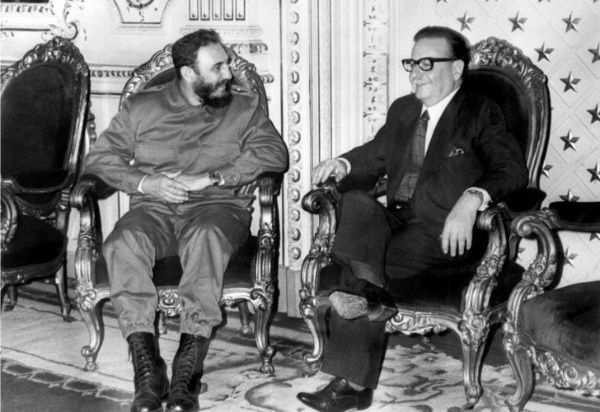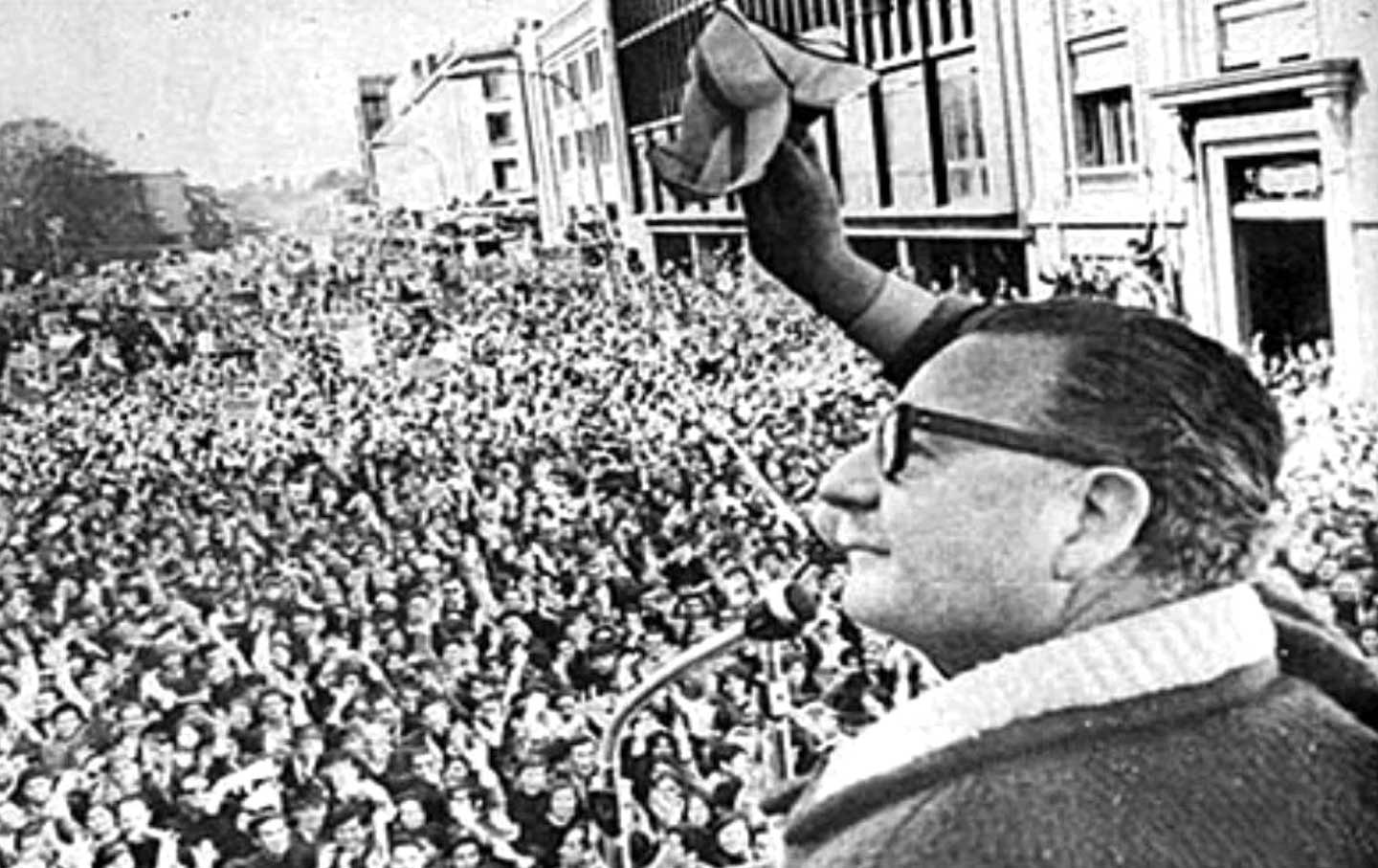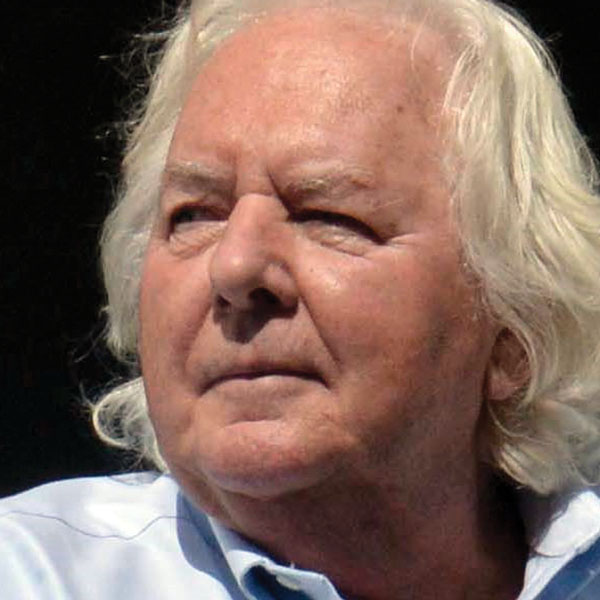
Salvador Allende, Democratic Marxist President of Chile.
The Economist Magazine
Hides Its Role in 1973 Chile Coup
John McEvoy / Jacobin
September 29, 2023) — The Economist decided to mark the fifty-year anniversary of Chile’s coup by insisting that Chileans move on from the events of 1973 — even as its own writer distorted the historical record beyond recognition.
On September 11, 2023, exactly fifty years after the brutal 1973 coup, the Economist published an article under the ominous subheading: “Rather than cautionary tale, Salvador Allende has become a cherished myth for the left.”
In what was offered as a “hard history lesson,” the author declared that Chile’s coup “was home-grown and commanded much support among Chileans,” adding that it “was the consequence of a disastrous political failure, that of Allende’s Popular Unity coalition.”
In a separate post, the Economist announced that: “It would be better for Chile if Salvador Allende and Augusto Pinochet become purely historical figures, rather than sources of political inspiration.”
This is exactly the kind of historical revisionism and erasure that one might expect from a publication that played a role in the destabilization of Chilean democracy and itself helped to usher in the Pinochet government.

Coup leader and dictator Pnochet meets with Henry Kissenger.
“Abandoning Democratic Fair Dealing”
To understand the present-day apologia for Chile’s coup, it is worth revisiting how the Economist reported on Chile in the 1970s.
In the month between Chile’s 1970 election and Allende’s inauguration, the Economist ran a scare campaign suggesting that it might not be possible to remove Allende from power.
On September 12, 1970, eight days after his election victory, the Economist wrote that: “The first question thrown at the irascible Dr Allende, whose truculence bodes ill for his enemies, was whether he would hold free elections in 1976.”
The text, which ran under the header “But can they vote him out again?,” continued: “Having voted him into power, many Chileans are starting to wonder whether they will be able to vote him out again.”
The Economist also entertained the notion that Allende could be blocked from acceding to the presidency. On September 19, 1970, it noted that “many Chileans are still pinning their hopes to the outside possibility that congress could choose Sr Alessandri, abandoning democratic fair dealing, perhaps, but still staying within the law.”
At this time, such a plot was being covertly instigated by the CIA.
“One early scheme called for [Christian Democrat Eduardo] Frei to annul the elections, name a military cabinet to run the government, appoint the runner-up Jorge Alessandri as interim president, and resign with the expectation of running for president again in new elections,” declassified US files revealed.

Fidel Castro and Salvador Allende.
The Allende Years
Once Allende’s Popular Unity government was in power, the Economist published a series of articles ginning up the possibility of a coup, or even civil war, in Chile.
Between December 1971 and August 1973, the free-marketer weekly issued headers on Chile including “The portents of civil war,” “Birth of a civil war,” “Stirrings in the barracks,” “Generals in the wings,” “Leaving the army in charge,” and “The army will be tough this time.” Far from simply reporting on the developments in Chile, the coverage seemed to justify claims that a military intervention might be necessary.
Another article was published on September 1, 1973, ten days before the coup, with the threatening headline: “Near the road’s end.”
Paradoxically, the Economist was simultaneously disparaging Allende’s claims that the US government was working against him with the help of reactionary forces inside Chile.
In 1972, investigative journalist Jack Anderson revealed that the International Telephone and Telegraph Corporation (ITT) had conspired with the CIA to prevent Allende from coming to power.
“Come off ITT,” declared the Economist in April 1972. “The documents . . . have given Chile’s President Salvador Allende the chance to blame some of his political and economic problems on right-wing intrigues sponsored by the Americans.” It concluded: “In short, nothing terrible was done.”
In March 1973, the Economist even likened the Chilean left to the Nazis, complaining that “President Salvador Allende’s supporters seem to be trying — not for the first time — to employ the Reichstag fire technique to discredit his opponents.”
After a failed coup attempt against Allende on June 29, 1973, known as El Tanquetazo, the Economist spun the event into a win for the Popular Unity government. This “was just what President Allende of Chile needed to revive his government’s failures,” given it “will divert attention . . . from the state of the economy.”
And one month before the eventual coup, the Economist made the risible claim that Allende’s “constant accusations of right-wing plots no longer carry much conviction in Santiago.”

Salvador Allende: “Happiness is a human right.”
Temporary Death
The Economist responded to Chile’s coup with a full-throated denial of US involvement, while placing the blame for the military takeover at the feet of Allende.
On September 15, 1973, it infamously declared that: “The temporary death of democracy in Chile will be regrettable, but the blame lies clearly with Dr Allende. . . . Their coup was homegrown, and attempts to make out that the Americans were involved are absurd.”
Over the following months, the Economist continued its apologia for the Pinochet government by countering Western critics of the dictatorship’s human rights record, and flattering its international credibility.
Under the header “They mustn’t forget why they struck down Allende,” the magazine announced in October 1973 that: “The junta has been the victim of a campaign of organised hostility in the west as well as of its own mistakes”.
The article continued: “Perhaps the imposition of martial law, the mass interrogations and the summary execution of snipers would not have aroused so much criticism if there were a clearer understanding of the events that precipitated the coup.”
Meanwhile, the Economist helped to shift responsibility for the coup onto the Chilean left by propagating the claim that “the extremists in the Allende government were preparing an insurrection of their own ‘to complete the revolution.’” It continued: “The only doubt is whether Dr Allende himself would have played the role of Lenin or Kerensky if that had finally come about.”

The Economist’s Latin America editor, Robert Moss.
The Economist and the Intelligence Services
The Economist’s reporting on Chile cannot be analyzed without reference to the publication’s connections to the US and British intelligence services.
During the 1970s, the Economist’s Latin American editor was a man named Robert Moss.
Recently declassified UK files show that Moss was “an IRD contact.” In other words, he was an asset of the Foreign Office’s secret Cold War propaganda unit, the Information Research Department (IRD).
The IRD’s Latin American desk chief, Rosemary Allott, described Moss as “a bright young Australian and good company,” and encouraged British embassies across Latin America to assist Moss in his journalistic activities.
During the Cold War, the IRD also supported the Economist by purchasing copies of the magazine and distributing them to agents of influence in foreign countries such as journalists, politicians, and military figures.
In other words, the UK Foreign Office helped the Economist both downstream and upstream — by influencing its journalists’ output and assisting with the magazine’s distribution.
In 1972, Moss traveled to Chile to write a CIA-funded book about Allende’s Popular Unity government. Moss had been recommended to the CIA by Brian Crozier, an MI6 “alongsider” who was also in receipt of secret funding from the IRD, recently declassified files show.
Moss’s activities in Chile involved writing “negative stories on Allende almost every week” for the Economist, as historian Alexander Zevin found. He also lectured at CIA think tanks and rubbed shoulders with Chilean military officials.
Shortly after Moss’s visit to Chile, Allende personally intervened by writing a series of letters to the Chilean press. Allende was concerned that the Economist’s reports carried no byline (meaning nobody knew who was writing them), and were being uncritically republished across the Chilean press.
“Your newspaper has been publishing articles . . . that present a warped image of Chile’s reality, and which are not signed by any responsible journalist, but a ‘special correspondent’ of TheEconomist,” Allende wrote in a letter to Chilean daily La Tercera de la Hora. “Imposters like this cause considerable harm to our nation.”
Allende, of course, was correct. Moss operated within a shady network of US and British intelligence officials, and the Economist’s work was seen to be actively contributing to the destabilization of the Chilean government.

Moss’ CIA-funded book criticizing Allende.
“My Enemy Is Dead!”
After the coup, Moss transformed his CIA-funded book on Allende into an apologia for the Pinochet dictatorship. Named Chile’s Marxist Experiment, the book declared that the Chilean military’s “decision to intervene had nothing to do with Washington.”
Moss’ book was so favorable to the Chilean dictatorship that the junta bought 9,750 copies of it for distribution through its embassies.
Upon hearing news of Allende’s death, Moss also reportedly danced down the corridors of the Economist’s headquarters chanting: “My enemy is dead!”.
Pablo Sepúlveda Allende is the grandson of Salvador Allende. He recently spoke about Moss’s reaction to the coup in Chile for a forthcoming film about Britain’s secret role in the death of Chile’s democracy, stating that “the unfortunate thing is that certain parts of the press are not independent — they’re financed or form part of major economic interest groups.”
Moss would go on to become a speechwriter for Margaret Thatcher, who described Pinochet as Britain’s “staunch, true friend” and praised the former dictator for having “brought democracy to Chile.”
The Economist marked Thatcher’s death rather differently to that of Allende’s, commemorating the former UK prime minister in April 2013 as a “Freedom fighter.” “The essence of Thatcherism was to oppose the status quo and bet on freedom,” the article noted — which will undoubtedly come as news to Chileans.
For his part, Crozier went on to help Pinochet write the 1980 Chilean constitution, which still hangs over the country today.
Last Words to the Nation: Salvador Allende, 1973
The Black Agenda Report & The Marxists
https://www.marxists.org/archive/allende/1973/september/11.htm
(September 13, 2023) — Henry Kissinger is 99 years old and alive. Salvadore Allende never had the opportunity to live that long. The democratically-elected socialist president of Chile, Allende was toppled in a US/CIA-sponsored coup d’etat on September 11, 1973. A Marxist and member of Chile’s Socialist Party, Allende came to power despite a years-long effort by the CIA to prevent his election.
Allende pushed for nationalization of the country’s natural resources, especially its copper mines, arguing that the country’s economic sovereignty was the ultimate independence from colonialism. But the U.S. – then in the midst of the Cold War – did not want a legitimate socialist government to create a bad example. “The example of a successful elected Marxist government in Chile would surely have an impact on,” Kissinger argued , “other parts of the world…similar phenomena elsewhere would in turn significantly affect the world balance and our own position in it.”
Nixon’s government then planned to destroy the Allende government – through funding media campaigns, labor protests, and economic policies to, in Nixon’s words, “make [Chile’s] economy scream.” But they also worked directly with the Chilean military to push for the overthrow of Allende’s government.
At 9:10 am, on September 11, 1973, as the Chilean military was bombing the presidential palace, La Moneda, Allende delivered his last speech to his nation. Bold and defiant, but also angry and somber, Allende addressed the speech to the campesina (the “woman of the land”), the “worker, the farmer, the intellectual” – all those who had supported and would have benefited from the democratic socialist project to benefit the masses.
He castigated the cowardly move of the traitors to the nation, and promised that his death would be avenged: “I am certain that my sacrifice will not be in vain, I am certain that, at the very least, it will be a moral lesson that will punish felony, cowardice, and treason.”
It is important to point here to Kissinger’s singular role in destroying democracy in Chile and helping to set up the country with a 17-year brutal dictatorship under the ruthless Augusto Pinochet. Pinochet’s regime is responsible for the execution, torture, and disappearance of thousands of people. Kissinger was the one to help consolidate Pinochet’s regime. “We want to help, not undermine you,” Kissinger told Pinochet, “You did a great service to the West in overthrowing Allende.”
What happened to Allende, and to Chile, should serve as a lesson for those of us who seek revolutionary change. The Chilean model – the varied tactics used to destabilize governments with people-centered policies that challenge western economic and political hegemony – has been replicated many times. We can only look to Haiti as a clear example where the US employed similar tactics to try to prevent Jean Bertrand Aristide from coming to power; when that didn’t work, they used economic warfare, funded opposition groups, and funded a successful coup d’etat.
We should all remember September 11, 1973. We should remember Allende’s sacrifice, and Kissenger’s and the U.S. government’s obscene criminal acts against the people of Chile. We should remember the US empire’s tactics against peoples’ self-determination. That Kissinger is still breathing should both infuriate and invigorate us into action to help destroy all vestiges of US (and western) imperialism.
“Long live Chile! Long live the people! Long live the workers!”
We reprint Allende’s final speech below.
Allende’s Last Words to the Nation
Santiago de Chile, September 11, 1973My friends,
Surely this will be the last opportunity for me to address you. The Air Force has bombed the towers of Radio Portales and Radio Corporación.
My words do not have bitterness but disappointment. May they be a moral punishment for those who have betrayed their oath: soldiers of Chile, titular commanders in chief, Admiral Merino, who has designated himself Commander of the Navy, and Mr. Mendoza, the despicable general who only yesterday pledged his fidelity and loyalty to the Government, and who also has appointed himself Chief of the Carabineros [national police].
Given these facts, the only thing left for me is to say to workers: I am not going to resign!
Placed in a historic transition, I will pay for loyalty to the people with my life. And I say to them that I am certain that the seed which we have planted in the good conscience of thousands and thousands of Chileans will not be shriveled forever.
They have strength and will be able to dominate us, but social processes can be arrested neither by crime nor force. History is ours, and people make history.
Workers of my country: I want to thank you for the loyalty that you always had, the confidence that you deposited in a man who was only an interpreter of great yearnings for justice, who gave his word that he would respect the Constitution and the law and did just that. At this definitive moment, the last moment when I can address you, I wish you to take advantage of the lesson: foreign capital, imperialism, together with the reaction, created the climate in which the Armed Forces broke their tradition, the tradition taught by General Schneider and reaffirmed by Commander Araya, victims of the same social sector which will today be in their homes hoping, with foreign assistance, to retake power to continue defending their profits and their privileges.
I address, above all, the modest woman of our land, the campesina who believed in us, the worker who labored more, the mother who knew our concern for children. I address professionals of Chile, patriotic professionals, those who days ago continued working against the sedition sponsored by professional associations, class-based associations that also defended the advantages which a capitalist society grants to a few.
I address the youth, those who sang and gave us their joy and their spirit of struggle. I address the man of Chile, the worker, the farmer, the intellectual, those who will be persecuted, because in our country fascism has been already present for many hours — in terrorist attacks, blowing up the bridges, cutting the railroad tracks, destroying the oil and gas pipelines, in the face of the silence of those who had the obligation to protect them. They were committed. History will judge them.
Surely Radio Magallanes will be silenced, and the calm metal instrument of my voice will no longer reach you. It does not matter. You will continue hearing it. I will always be next to you. At least my memory will be that of a man of dignity who was loyal to [inaudible] the workers.
The people must defend themselves, but they must not sacrifice themselves. The people must not let themselves be destroyed or riddled with bullets, but they cannot be humiliated either.
Workers of my country, I have faith in Chile and its destiny. Other men will overcome this dark and bitter moment when treason seeks to prevail. Go forward knowing that, sooner rather than later, the great avenues will open again where free men will walk to build a better society.
Long live Chile! Long live the people! Long live the workers!
These are my last words, and I am certain that my sacrifice will not be in vain, I am certain that, at the very least, it will be a moral lesson that will punish felony, cowardice, and treason.
Posted in accordance with Title 17, Section 107, US Code, for noncommercial, educational purposes.